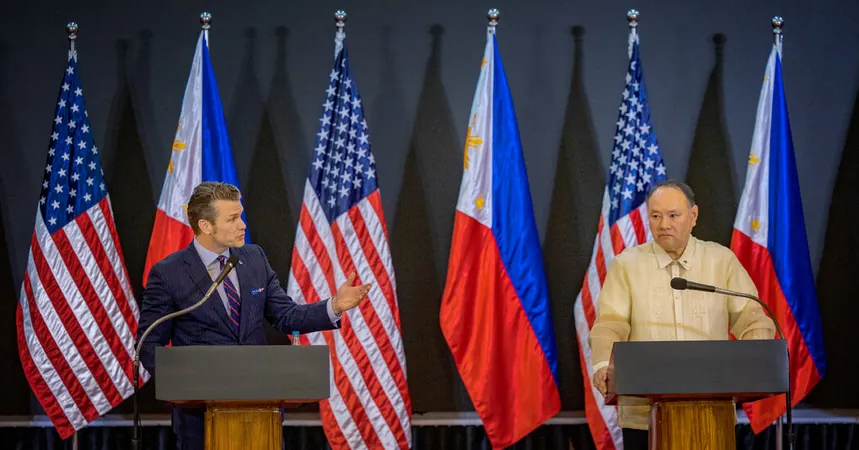
Hegseth’s Asia Trip: A Bold Move to Strengthen U.S. Alliances Against China!
2025-03-28
Author: Ting
Hegseth’s Asia Trip: A Bold Move to Strengthen U.S. Alliances Against China!
In his inaugural visit to Asia, Secretary of Defense Pete Hegseth aimed to bolster confidence among U.S. allies regarding America's steadfast commitment to countering the mounting Chinese threats in the region. Speaking at a news conference in Manila, Philippines, Hegseth highlighted the significant shift in focus that the Trump administration intends to make toward Asia, emphasizing this as a unique priority.
“Today, we are in the Philippines, and tomorrow, we’ll be heading to Japan. Following that, Australia and South Korea will be on our agenda,” he asserted, aiming to instill a sense of unity and preparedness among these key allies in establishing a deterrent front to avert potential conflicts.
This visit to the Philippines marks the initial leg of Hegseth’s Asian tour, which is significant as both the Philippines and Japan are bound by mutual defense treaties with the United States. However, they are increasingly wary due to President Trump’s recent cavalier attitudes toward long-standing alliances in North America and Europe.
Given the escalating tensions over Beijing's expansive territorial claims in the South China Sea, the Philippines can particularly relate to the urgency of these discussions. Similarly, Japan has raised alarms over frequent Chinese intrusions in waters near disputed islands in the East China Sea.
During his Manila visit, Hegseth met with Philippine President Ferdinand Marcos Jr., unequivocally stating, "Deterrence is necessary globally, and especially in your nation, against the threats posed by communist China."
In a surprising turn during the briefing, Hegseth addressed the controversy surrounding his prior actions of sharing sensitive military operational details regarding U.S. strikes against Houthi targets on the messaging platform Signal. Stating he wouldn’t dictate the movements of the U.S. Seventh Fleet in Asia, he expressed confidence in U.S. Admiral Samuel Paparo, commander of the U.S. Indo-Pacific Command, to handle those strategic choices.
“Admiral Paparo will craft strategic dilemmas for Communist China, prompting them to reconsider any aggressive actions,” he assured, eliciting humor from the audience.
When pressed about his responsibility in the Signal incident, Hegseth chose to highlight the effectiveness of the U.S. strikes, sidestepping the query entirely.
Further solidifying military cooperation, he announced upcoming joint exercises with Philippine forces in the Batanes islands, located a mere 120 miles south of Taiwan. These drills will include the deployment of an anti-ship missile system and unmanned surface vehicles, underlining Washington's commitment to strengthening its defense posture in a region replete with tensions.
Reflecting on the evolving relationship between the Philippines and the United States, Defense Secretary Gilberto Teodoro articulated the broader threat at hand. "What is at stake in our bilateral interactions transcends mere U.S. or Philippine security," he asserted. “We stand united against the expansive reach of the Communist Party of China.”
As the world watches, Hegseth's trip signifies a crucial moment in U.S. foreign policy, as it endeavors not only to reaffirm alliances but also to address the pressing threats posed by an increasingly assertive China. Will this newly invigorated commitment be enough to deter Beijing's ambitions? Only time will tell!




 Brasil (PT)
Brasil (PT)
 Canada (EN)
Canada (EN)
 Chile (ES)
Chile (ES)
 Česko (CS)
Česko (CS)
 대한민국 (KO)
대한민국 (KO)
 España (ES)
España (ES)
 France (FR)
France (FR)
 Hong Kong (EN)
Hong Kong (EN)
 Italia (IT)
Italia (IT)
 日本 (JA)
日本 (JA)
 Magyarország (HU)
Magyarország (HU)
 Norge (NO)
Norge (NO)
 Polska (PL)
Polska (PL)
 Schweiz (DE)
Schweiz (DE)
 Singapore (EN)
Singapore (EN)
 Sverige (SV)
Sverige (SV)
 Suomi (FI)
Suomi (FI)
 Türkiye (TR)
Türkiye (TR)
 الإمارات العربية المتحدة (AR)
الإمارات العربية المتحدة (AR)